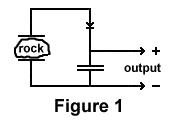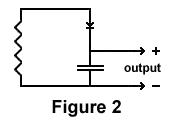"Anomalous Diurnal and Secular Variations in the Self-Potential
of Certain Rocks"
(Return to Index Page)
March 22, 1975
Honolulu, Hawaii
Copyrighted © by The Townsend Brown family. All rights reserved.


 Abstract
Abstract:
Studies of telluric electricity, as related to individual rocks,
have revealed the existence of diurnal cycles and secular variations in
self-potential.
Automatic recording and measurement of potential over a period
of several years appears to indicate that certain granitic and basaltic
rocks act as electric dipoles and spontaneously generate an emf ranging
to about 700 mV. These anomalous variations range to at least 50% in some
instances.
No adequate explanation appears to exist.
 Background
Background:
In earlier studies, in which the author was engaged at the
Naval Research Laboratory in 1931 to 1933, entitled "Anomalous Behavior
of Massive High-K Dielectrics" (classified), evidence was obtained that
the electrical resistivity of certain high-density dielectrics undergoes
solar and sidereal diurnal changes.
In subsequent work, at Navy-sponsored underground field
stations in Ohio (1937) and in Pennsylvania (1939), these findings were
confirmed and extended to include lunar effects. Largely because of the
striking lunar correlations, it was believed informally that the action
was gravitational in nature. Publication was withheld.
The investigation was interrupted by World War II but was
resumed in 1944 in California by the Townsend Brown Foundation (an Ohio
non-profit corporation) and was carried forward in two locations in
especially-constructed shielded rooms at constant temperature.
The earlier (Eastern) results were not specifically confirmed
in California, especially the lunar effects, and this caused confusion.
Although the automatic recordings were continued for more than 4 years
(1944 to 1949), the results never appeared to be directly compatible with
the earlier results in the East. No interpretation as to the gravitational
origin seemed appropriate.
During the 20-year period from 1950 to 1970, research in this
field was continued by the Foundation but was directed more toward the
electrokinetic effects of massive dielectrics (movement of barium titanate
blocks, etc.). These studies were performed in the United States and in
France. They involved the use of very high voltages (up to 300KV) and high
vacuum test chambers under rigorously controlled test conditions. This was
done to advance gravitational theory and to attempt to resolve the earlier
conflicts. Publication was withheld until a clearer understanding could be
obtained.
In 1970, using improved computer-type equipment, automatic
recordings were resumed in a relatively isolated location on Catalina
Island, 28 miles off the coast of Southern California. The effort was
directed toward the detection and measurement of gravitational radiation.
Special attention was paid to the design of non-resonant sensors
utilizing resistance changes in massive dielectrics. This led to an
investigation of resistance changes generally in various materials, heavy
metals and semi-conductors. Observations were conducted at various
altitudes in an effort to detect changes correlated with sidereal time and
hence pinpoint the possible origin of gravitational radiation believed
(Joseph Weber) to come from the center of the galaxy.
In 1974, automatic recording equipment was moved to the
Haleakala Observatory of the Hawaii Institute of Geophysics, for
high-altitude observations, and in 1975 it was moved to Honolulu where
recording is being continued day and night.
To date, these observations seem to indicate that the cause of
the phenomenal variations can be found in the changes in resistivity and the
spontaneous generation of rf noise in massive high-K dielectric materials,
including stone. Whether this is of gravitational origin, arising from the
influx of gravitational radiation from space (or some similar energy source)
remains to be determined.
 Conclusion
Conclusion:
Studies to date of the cyclic effects appear to indicate the
existence of two related phenomena:
1) Radio frequency noise (wide range of spectral bands)
spontaneously and intrinsically generated in dielectric materials as a
function of mass and dielectric constant.
2) Self-potential (dc) in certain rocks.
This leads to a tentative hypothesis that the energy represented
in the so-called "rock" electricity, as exhibited by certain rocks,
originates in a specific spectral band of radio frequency currents set up
by a penetrating external flux.
It is noted that rocks have a wide variety of cyclic patterns,
the phasing of which differs from one rock to another. The interpretation
of this phenomenon might be, therefore, that the spectral band (rf) to
which each individual rock is attuned is different. Hence, each rock senses
only that portion of the very broad spectrum of the ambient flux to which
it is resonant.

In the case of rock electricity, rectification from rf to dc,
presumably, could take place internally. The natural capacitance of the
rock could serve to store the rectified dc, so that a more or less
continuous output is observed. In a sense, the rock becomes a
quasi-permanent electric dipole or electret and, actually, is a continuous
converter of energy.
The same may be said of the alternate system, the so-called
"synthetic rock," made up of a resistor, diode and capacitor, as shown in
Figure 2.

To insure significant results, all systems should be operated
within electrostatic and magnetic shields. Shielding against very low and
very high electromagnetic radiation is difficult to accomplish, so
theoretical consideration must be given to the possibility of effects
entering from this quarter. The same applies to other penetrating
radiations such as from radioactivity or cosmic rays.
A great amount of theoretical and empirical work must be completed before
any positive conclusion can be reached. It is a challenge and, perhaps, a
worthy one.


 Please be advised that this document is copyrighted © by The Townsend Brown family. All rights reserved.
Please see Legal and Copyright Information for additional copyright information.
Please be advised that this document is copyrighted © by The Townsend Brown family. All rights reserved.
Please see Legal and Copyright Information for additional copyright information.




